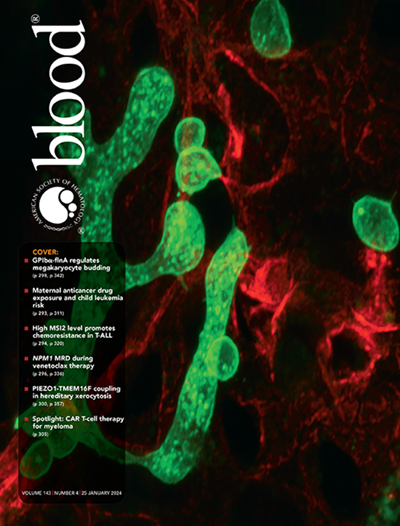Fixed-Duration Epcoritamab Plus R2 Drives Favorable Outcomes in Relapsed or Refractory Follicular Lymphoma.
IF 23.1
1区 医学
Q1 HEMATOLOGY
引用次数: 0
Abstract
Epcoritamab is a subcutaneous CD3xCD20 bispecific antibody approved as monotherapy for relapsed/refractory (R/R) follicular lymphoma (FL). We evaluated fixed-duration epcoritamab with rituximab plus lenalidomide (R2) in R/R FL in arm 2 of EPCORE® NHL-2 (phase 1b/2; NCT04663347). Patients received epcoritamab (2 step-up doses, then 48-mg full doses) for up to 2 years and R2 for up to 12 cycles (28 days/cycle). Primary endpoint was overall response rate (ORR) per investigator assessment (Lugano criteria). As of September 21, 2024, 108 patients received ≥1 epcoritamab dose in expansion (median follow-up, 28.2 months). Median age was 65 years; 57% had 1 prior line of therapy. ORR and complete response (CR) rate were 96% and 88%; CR rates in patients with high-risk features were 90% (primary refractory), 82% (refractory to anti-CD20 and an alkylating agent), and 83% (disease progression within 24 months of first-line therapy). Two-year estimates for remaining in CR, progression-free survival, overall survival, and not starting next antilymphoma therapy were 82%, 76%, 90%, and 84%, respectively. Minimal residual disease negativity was observed in 86% of evaluable patients (clonoSEQ® assay). Common treatment-emergent adverse events (TEAEs) included neutropenia (65%), COVID-19 (59%), and cytokine release syndrome (CRS; 51%). Grade (G) ≥3 TEAEs occurred in 87% of patients; 5 had G5 TEAEs (all COVID-19). CRS events were mostly low grade (38% G1, 11% G2, 2% G3), all resolved, and none led to epcoritamab discontinuation. Fixed-duration epcoritamab plus R2 demonstrated deep, durable responses with manageable safety and favorable outcomes in R/R FL, irrespective of risk features.固定时间依可利他单抗+ R2治疗复发或难治性滤泡性淋巴瘤的有利结果
Epcoritamab是一种皮下CD3xCD20双特异性抗体,被批准作为复发/难治性(R/R)滤泡性淋巴瘤(FL)的单药治疗。我们在EPCORE®NHL-2 (1b/2期;NCT04663347) 2组的R/R FL患者中评估了固定疗程的依可他单抗与利妥昔单抗联合来那度胺(R2)。患者接受epcoritamab(2次加强剂量,然后是48mg全剂量)治疗长达2年,R2治疗长达12个周期(28天/周期)。主要终点是每个研究者评估的总缓解率(ORR) (Lugano标准)。截至2024年9月21日,108例患者接受了≥1剂量的扩展治疗(中位随访28.2个月)。中位年龄为65岁;57%的患者既往接受过1次治疗。ORR和完全缓解率分别为96%和88%;具有高危特征的患者的CR率分别为90%(原发性难治性)、82%(抗cd20和烷基化剂难治性)和83%(一线治疗24个月内疾病进展)。2年的CR、无进展生存期、总生存期和未开始下一次抗淋巴瘤治疗的估计分别为82%、76%、90%和84%。86%的可评估患者(clonoSEQ®检测)观察到最小残留疾病阴性。常见的治疗不良事件(teae)包括中性粒细胞减少症(65%)、COVID-19(59%)和细胞因子释放综合征(CRS; 51%)。87%的患者发生(G)级≥3级teae;5例teae为G5(均为COVID-19)。CRS事件多为低度(G1 38%, G2 11%, G3 2%),均已解决,且无一例导致依可他单抗停药。固定持续时间的epcoritamab + R2在R/R FL中表现出深度、持久的反应,具有可控的安全性和良好的结果,无论风险特征如何。
本文章由计算机程序翻译,如有差异,请以英文原文为准。
求助全文
约1分钟内获得全文
求助全文
来源期刊

Blood
医学-血液学
CiteScore
23.60
自引率
3.90%
发文量
955
审稿时长
1 months
期刊介绍:
Blood, the official journal of the American Society of Hematology, published online and in print, provides an international forum for the publication of original articles describing basic laboratory, translational, and clinical investigations in hematology. Primary research articles will be published under the following scientific categories: Clinical Trials and Observations; Gene Therapy; Hematopoiesis and Stem Cells; Immunobiology and Immunotherapy scope; Myeloid Neoplasia; Lymphoid Neoplasia; Phagocytes, Granulocytes and Myelopoiesis; Platelets and Thrombopoiesis; Red Cells, Iron and Erythropoiesis; Thrombosis and Hemostasis; Transfusion Medicine; Transplantation; and Vascular Biology. Papers can be listed under more than one category as appropriate.
 求助内容:
求助内容: 应助结果提醒方式:
应助结果提醒方式:


